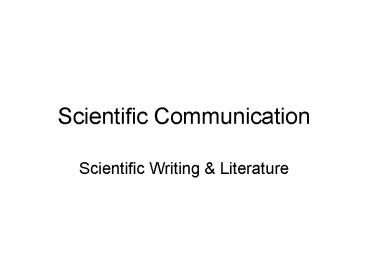Scientific Communication - PowerPoint PPT Presentation
1 / 21
Title:
Scientific Communication
Description:
Compilations and Textbooks. 3. Popular. Scientific Literature. 1. Primary: ... Published in Scientific Journals or Conference ... Compilations and Textbooks ... – PowerPoint PPT presentation
Number of Views:29
Avg rating:3.0/5.0
Title: Scientific Communication
1
Scientific Communication
- Scientific Writing Literature
2
Scientific Literature
- Three basic types
- Primary
- 2. Secondary
- Review papers
- Compilations and Textbooks
- 3. Popular
3
Scientific Literature
- 1. Primary
- Reports original results of experiments or
observations. - Typically peer-reviewed
- Published in Scientific Journals or Conference
Proceedings - The best source for information on specific
subjects because it is the initial report of
findings.
4
Scientific Literature
- 1. Primary
- Scientific Journals
- Usually published by a scientific society
specializing in the specific subject - Peer-reviewed manuscripts are sent to the
editor, who sends it out to multiple scholars in
the field that make comments. Those comments are
than sent to the author(s) and they are
addressed. The editor, with input from the
reviewers, then decides if the manuscript is to
be published or it is in need of additional
revisions.
5
Scientific Literature
- 1. Primary
- Conference Proceedings
- Published by the organization that organizes a
conference or meeting - Includes the findings that were presented during
that meeting. - May or may not be peer-reviewed
6
Scientific Literature
- 2. Secondary
- Literature Review
- A synopsis of recent or historical primary
literature designed to draw comparisons or
provide a better understanding of the subject. - Published in a variety of formats, including
Scientific Journals, Proceedings, and Society
Newsletters. - May or may not be peer-reviewed
7
Scientific Literature
- 2. Secondary
- Compilations and Textbooks
- Much like a Literature Review, but with a broader
treatment of the subject. - Typically published in book form.
- Not formally peer-reviewed, but open to criticism
after publication. Most authors do submit their
works to friendly peers prior to submission. - Typically a good source of knowledge on a
subject, incorporating primary literature into
the overall work
8
Scientific Literature
- 3. Popular
- Magazines, Newspapers, Internet Blogs, etc.
- Often a source of good practical information, but
must be read with caution. - Almost never reviewed for content.
- Good way to communicate scientific findings to
laypersons who may not be as knowledgeable on the
subject. - Is targeted at a different audience than others.
- Utilizes a different style of writing than
others.
9
Scientific Writing
- General Rules
- Be thorough
- Be concise
- Be descriptive, but avoid fluff
- Label all figures and tables so that they can
stand alone
10
Scientific Writing
- You must be proficient at writing so that you can
properly and professionally convey your findings
and views to members of your respective
community. - Formats for written communication that are
important to you - Letters and E-mail
- Lab Reports and Scientific Papers
- Essays and Short Answer Questions on Exams
11
Scientific Writing
- LAB REPORTS
- Will follow general form of a scientific paper
- Must follow the Instructions for Writing a
Laboratory Report that is accessible from
http//biology.uta.edu/cwatson . - Must include at least two primary citation.
- You will learn how to access and search databases
online today. - Must draw intelligent conclusions from the data.
- No page number requirement, but should not exceed
10 pages.
12
Scientific Writing
- LAB REPORTS
- Components of a Scientific Paper
- Title
- Abstract
- Introduction
- Materials and Methods
- Results
- Discussion
- Literature Cited
13
Scientific Writing
- LAB REPORTS
- Title
- Simple, yet descriptive
- Abstract
- A brief summary of your paper
- Materials and Methods
- What materials did you use?
- What were the methods of the experiment?
- This section is what defines the experiment for
repeatability. It is important that you are
extremely thorough here
14
Scientific Writing
- LAB REPORTS
- Results
- This is reserved simply for reporting results. No
conclusions should be drawn from these results,
yet. - Discussion
- This is where conclusions and predictions are
made. - The meat and potatoes of the report
- Literature Cited
- What references did you use?
15
Scientific Writing
- LAB REPORTS
- Literature Cited
- How do I site a reference?
- Different conventions depending on the field of
study. - Typically, we place the name of the author and
the year the article was published in parenteses.
- Ex may not reach previous densities until
hardwood leaf litter is present (Watson, 2005). - This would correspond to a citation in the Lit
Cited section
16
Scientific Writing
- LITERATURE CITED
- Articles
- Watson, Charles M. 2005. Post-burn substrate
preference of the ground skink, Scincella
lateralis, in East Texas. Herpetological Times
11(2). Pp 223-225. - Books
- Soloman, Berg, and Martin. 2004. Biology, 7th ed.
Brooks/Cole-Thompson Learning. Belmont, CA
17
Scientific Writing
- Tables and Figures
- Must stand alone
- If seperated from the report, it must be
understandible as a document. - May be cited in text as (Figure 1.) or Figure 1
shows that.
18
Prey Availability
19
Synthesis
20
Synthesis
21
Scientific Writing
- Tables and Figures
- How to produce tables and figures in Excel
- Go over it in on computer.
- Assignment for next week
- Graphing Assignment

